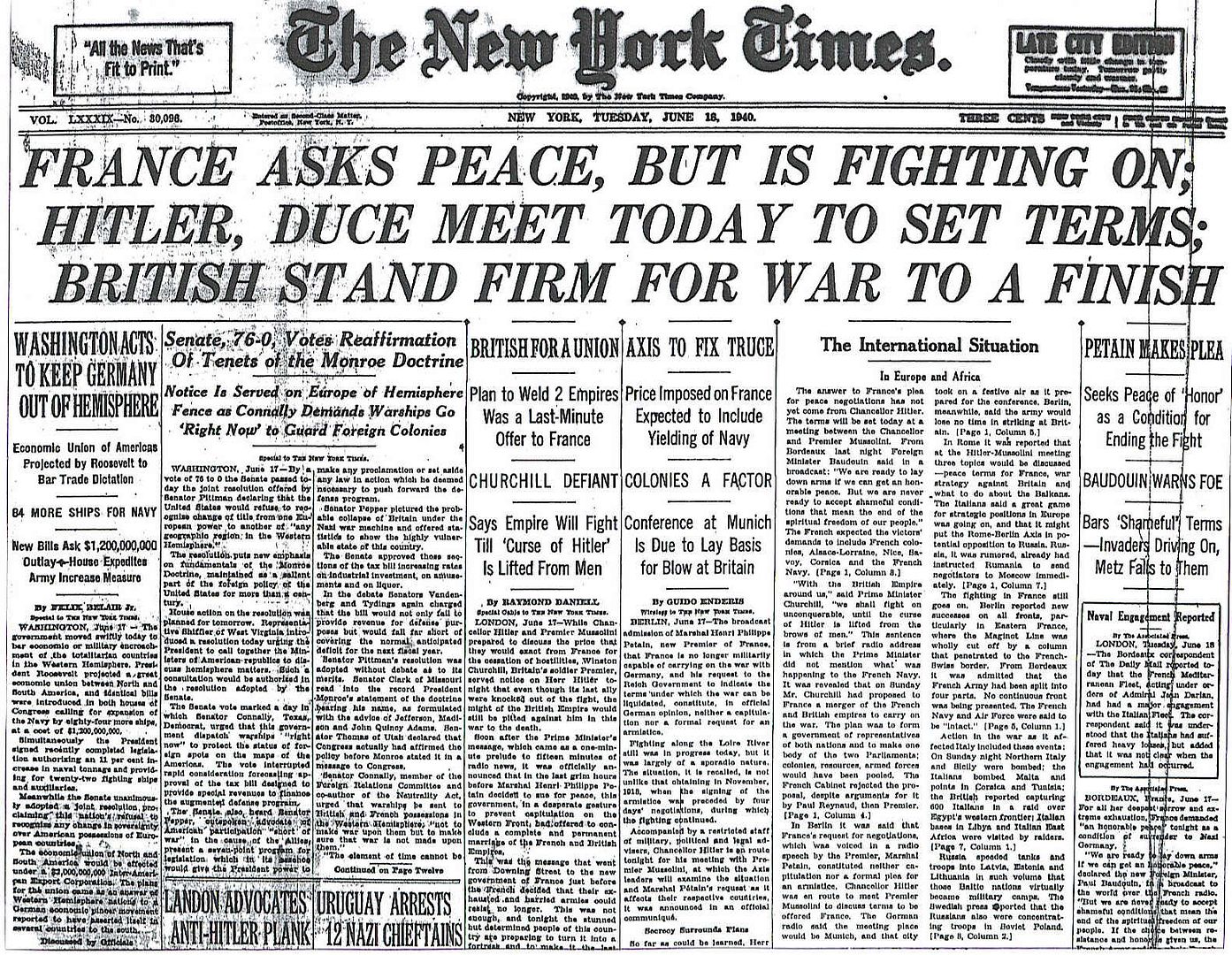
Posted on 06/18/2010 4:55:52 AM PDT by Homer_J_Simpson

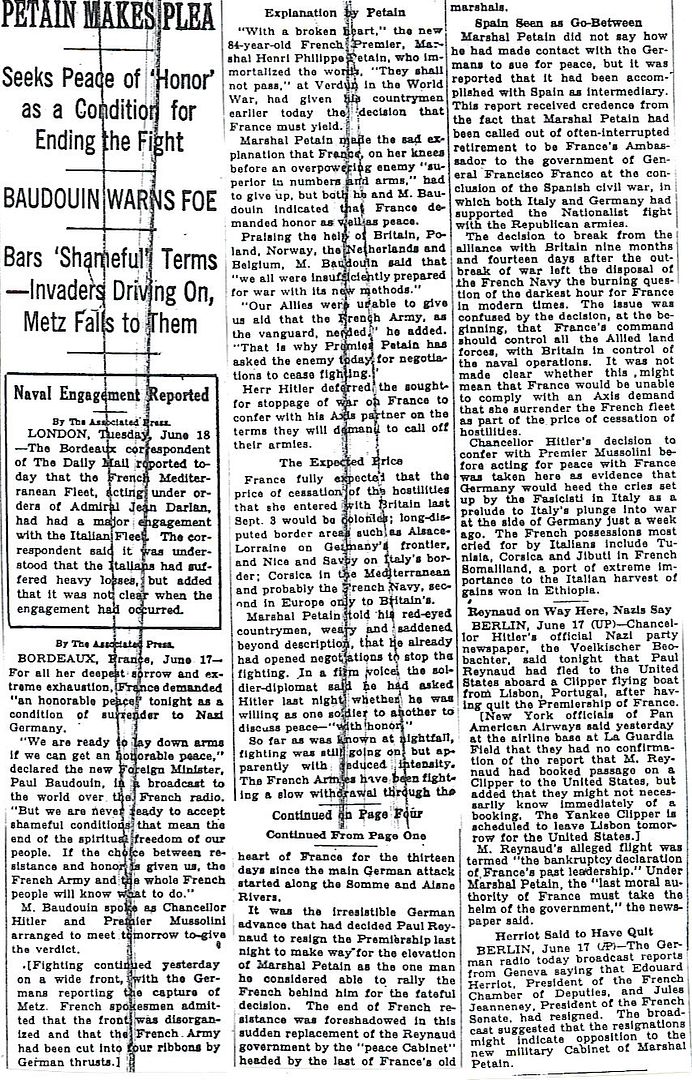
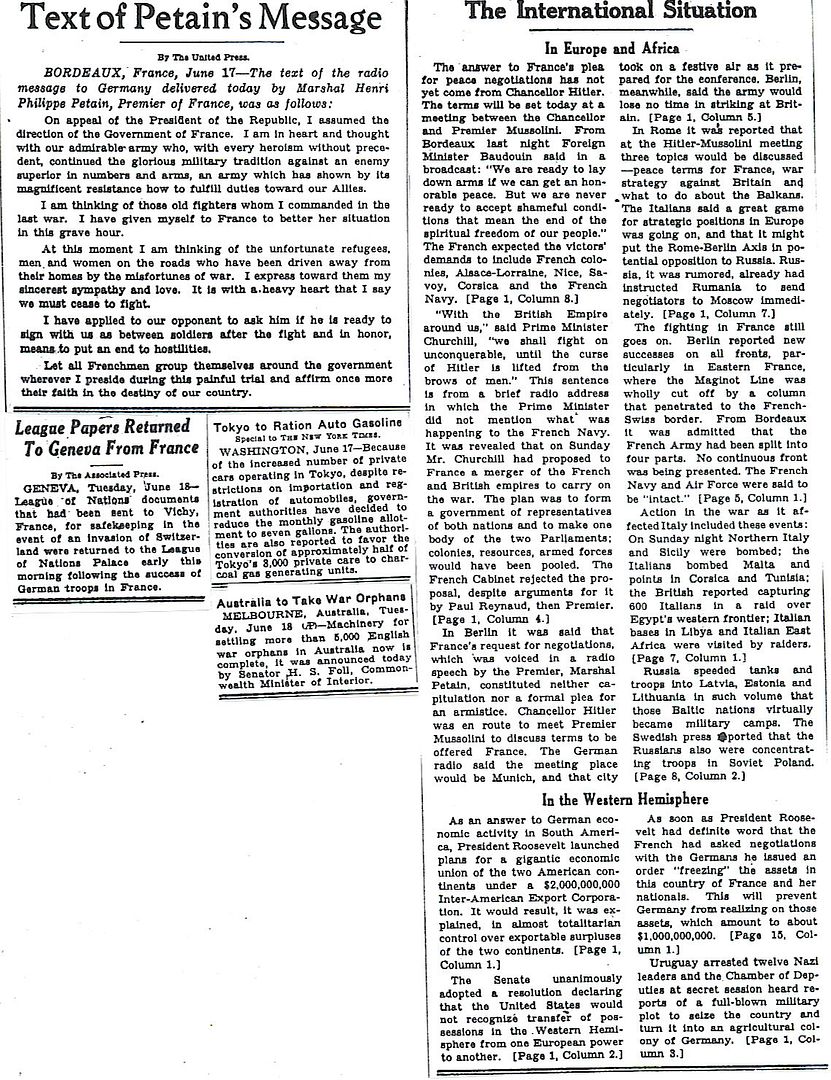
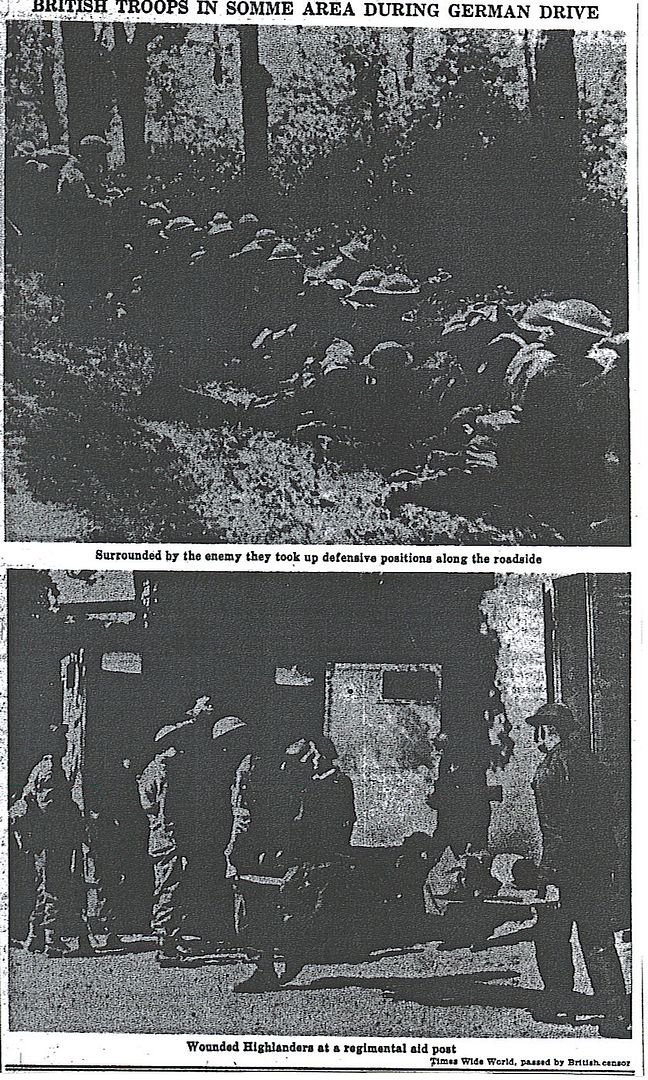
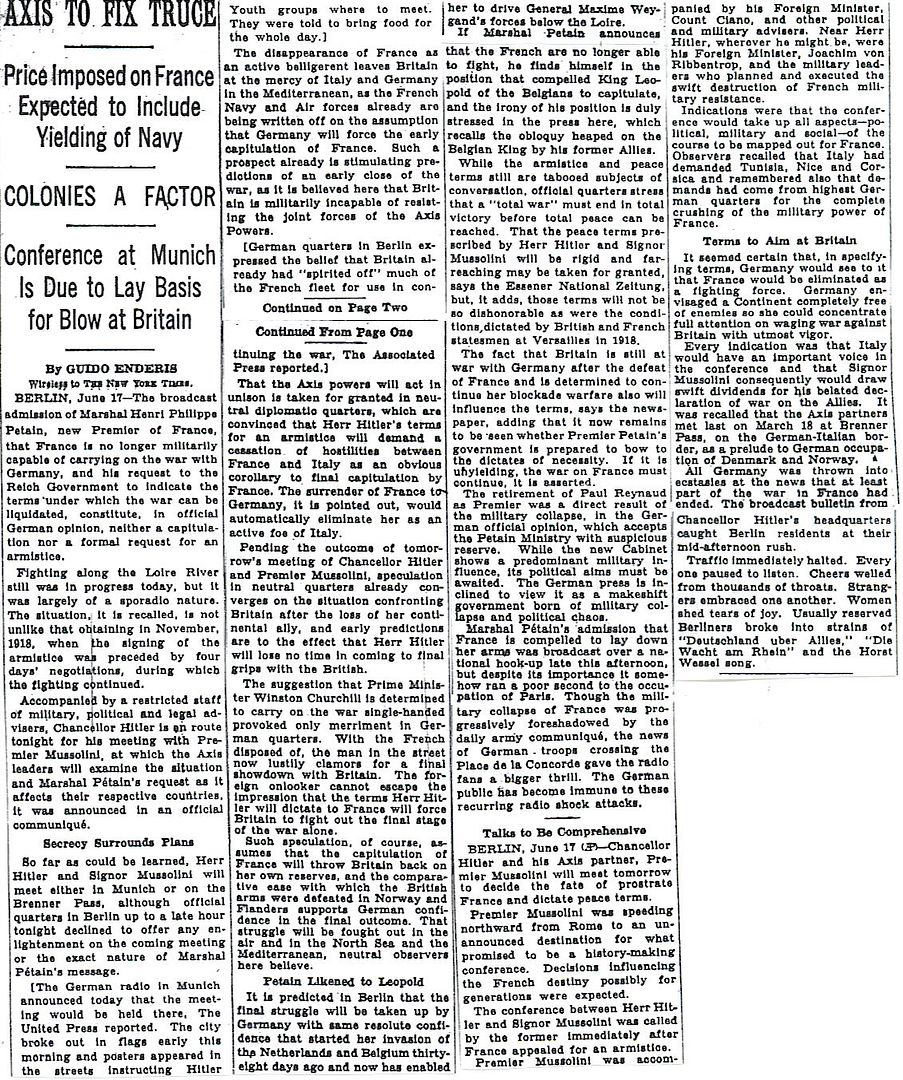
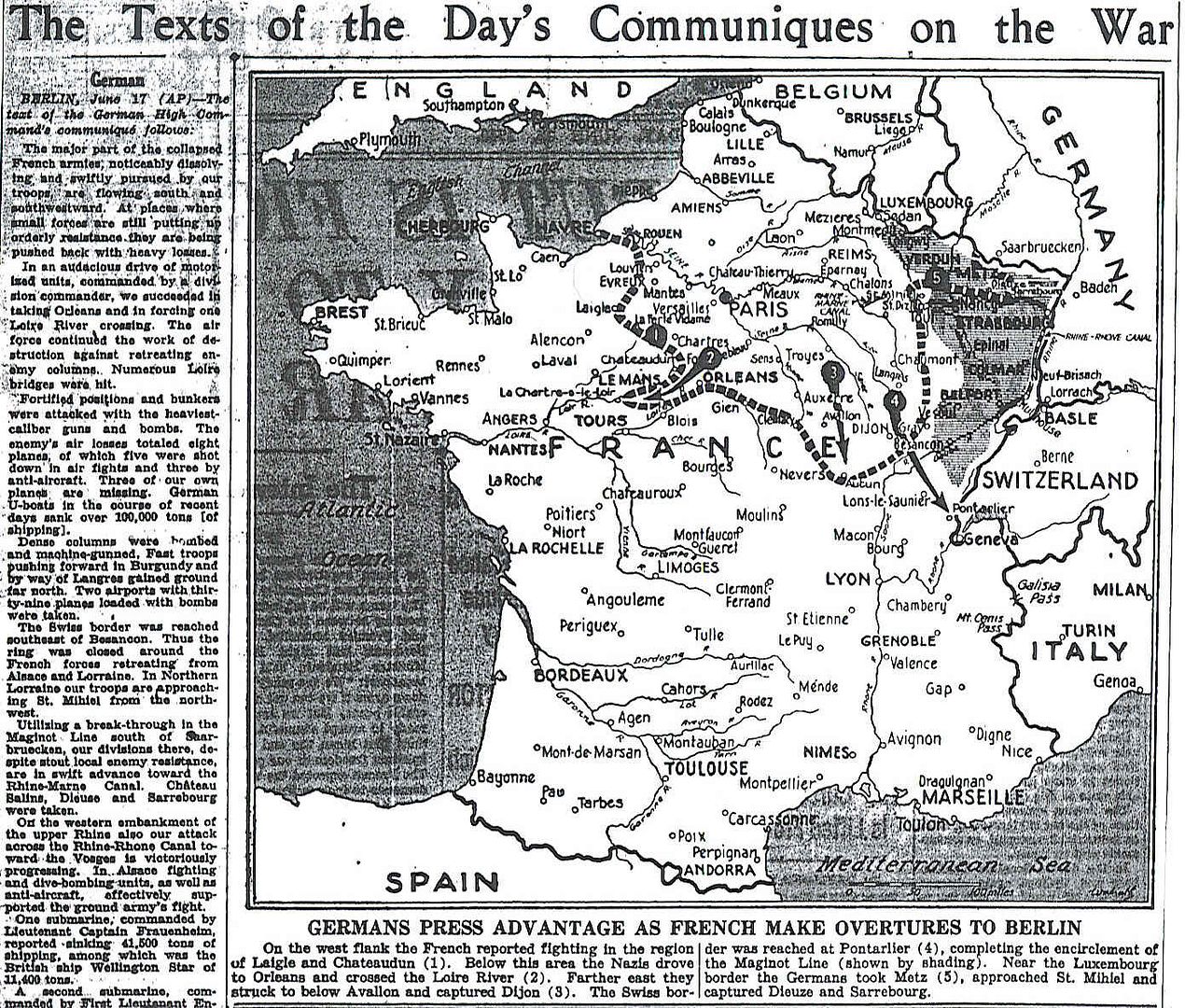
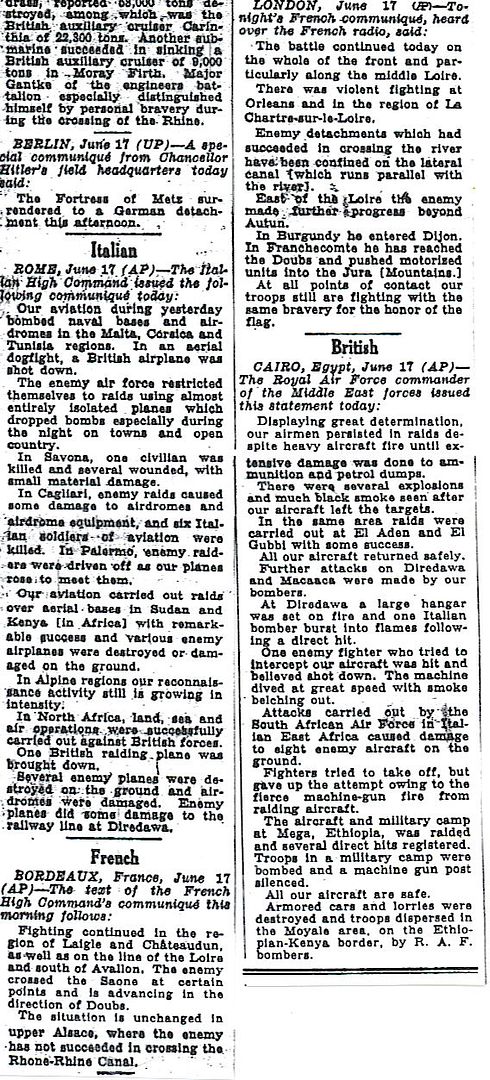
http://www.onwar.com/chrono/1940/jun40/f18jun40.htm
Germans capture Cherbourg, Brest
Tuesday, June 18, 1940 www.onwar.com
On the Western Front... The German advance continues inexorably. The 7th Panzer Division takes Cherbourg, 5th Panzer Division occupies Brest. Among other towns captured are Le Mans, Briare, Le Creusot, Belfort, Dijon and Colmar.
Over Germany... The RAF bomb Hamburg and Bremen.
From London... General de Gaulle, as yet comparatively unknown to the majority of his countrymen, makes a radio address urging the French to fight on, saying that only a battle and not the whole war has been lost.
http://homepage.ntlworld.com/andrew.etherington/month/thismonth/18.htm
June 18th, 1940
UNITED KINGDOM:
RAF Bomber Command: 4 Group (Whitley). Bombing - oil plants - industrial works - marshalling yards - communications.
10 Sqn. Four aircraft to Soest marshalling yards. All bombed.
51 Sqn. Nine aircraft to oil plant Frankfurt. All bombed.
58 Sqn. Five aircraft to Dusseldorf. All bombed. Five aircraft to Castrop-Rauxel. Four bombed, one FTR.
77 Sqn. Seven aircraft to oil plants at Hanover and Sterkrade. All bombed.
102 Sqn. Seven aircraft to oil plants Sterkrade and Bottrop. Five bombed, one FTR.
London: General Charles de Gaulle, little known even in France outside military circles until he became under-secretary for national defence in the last days of the Reynaud government, has flown to England and broadcast this appeal:
“Speaking in full knowledge of the facts,” he said, “I ask you to believe me when I say that the cause of France is not lost.” He called on French officers and men, including civilians, to get in touch with him. “Whatever happens,” declared the general, “the flames of French resistance must not and shall not die.”
Churchill broadcasts that the Battle of France is over and the Battle of Britain is about to begin. “Let us bear ourselves that, if the British Empire and Commonwealth last for 1,000 years, men will say, “This was their finest hour.” and ends with “Our professional advisers of the three services unitedly advise that we should continue the war and that there are good and reasonable hope of final victory.”
Corvettes HMS Freesia and Orchis laid down.
Destroyer HMS Southwold laid down.
Submarine HMS P-33 laid down.
Corvette HMS Erica launched.
Corvette HMS Camellia commissioned. (Dave Shirlaw)
FRANCE: The 7th Panzer Division takes Cherbourg. The 5th Panzer Division reaches Brest.
Rennes: General Altmayer and HQ 10 French Army surrender. Thus ending any hope of a “Brittany Stronghold”.
Submarines FS Achille and Agosta, Ouessant, Pasteur, Gunboats Enseigne Henry, Etourdi, Destroyer Cyclone scuttle at Lorient to prevent capture by Germans.
Gunboat FS Vauquois sunk off Brest by magnetic mine. (Dave Shirlaw)
GERMANY: Munich: In the Führerhaus, where Neville Chamberlain signed away Czechoslovakia two years ago, Mussolini and Hitler met today to discuss the armistice terms to be imposed on France. Mussolini has been surprised at the German insistence on moderate terms for the defeated enemy.
The Fuhrer’s aim is to encourage the French to break with the English and to discourage them from continuing the war in North Africa. Petain and the peace lobby must be encouraged, Hitler said. So Mussolini has been told he will not be allowed to seize huge areas of southern France.
U.S.S.R.: The Soviet occupation is completed in the Baltics. For the Soviet intrusion into the German sphere of influence, Stalin compensated Germany with a payment of 7.5 million gold dollars. (Jack McKillop)
BULGARIA: Bulgaria demands Dobruja and outlet to Aegean Sea. (Dave Shirlaw)
SPAIN: U-43 refuelled from the German supply ship Bessel in Vigo. (Dave Shirlaw)
PACIFIC OCEAN: SS Niagara (13,415 GRT) Canadian Pacific Steamships Line passenger liner sunk when she struck a German mine laid by the disguised merchant raider ORION, in the Hauraki Gulf off, New Zealand, in position 35.53S, 174.53E. She was carrying a secret cargo of gold bullion to purchase military supplies. The gold was recovered a year later after a dangerous diving operation. There was no loss of life in this incident. (Dave Shirlaw)
CANADA: Corvettes HMCS Algoma and Rosthern laid down Port Arthur, Ontario.
French cruiser Emile Bertin arrives in Halifax with $305 million in gold from the Bank of France; gold released after the war. (Dave Shirlaw)
U.S.A.: The U.S. Secretary of State Cordell Hull directs the Deputy U.S. Ambassador to France to advise the French government that if the French fleet falls into German hands, France would “permanently lose the friendship and goodwill of the Government of the U.S.” The French reiterate their statement that the French fleet “would not be surrendered to the Germans.” (Jack McKillop)
ATLANTIC OCEAN: At 1200, the Sarmatia was stopped by a shot across her bow by U-28 and the crew immediately abandoned ship. The U-boat had missed with one torpedo at 1100 and then surfaced to stop the ship. She sank vertical by the stern three minutes after being hit in the engine room by a coup de grâce at 1210. The Germans questioned the survivors and gave them cigarettes, a bottle of rum and the course for land before leaving the area. The survivors were picked up by the Spanish trawlers Felix and Pastor Montenegro and landed at Vigo on 21 June.
At 1902, the unescorted and unarmed Altair was torpedoed and shelled by U-32 and sank west of Ireland. The two Norwegian lifeboats picked up 19 fishermen of the two Spanish trawlers Sálvora and Faro-Ons, which were sunk by the same U-boat shortly afterwards. All survivors were picked up later by two other Spanish trawlers and taken to Pasages, Spain on 21 June.
U-32 stopped the two Spanish trawlers Sálvora and Faro-Ons because they were outside of the allowed area of fishing and sank both by gunfire after the crew abandoned ship. Two lifeboats picked up 19 fishermen from both ships from Altair, which had been sunk by the same U-boat a few hours before. All survivors were later rescued by two other Spanish trawlers and taken to Pasages, Spain arriving there on 21 June.
(Dave Shirlaw)
http://worldwar2daybyday.blogspot.com/
Day 292 June 18, 1940
Rommel’s 7th Panzer Division races 200 miles and reaches Cherbourg. However, they arrive too late to prevent the Allied evacuation and rest overnight before attacking the fortifications. Operation Ariel finishes at St. Nazaire (leaving behind all their equipment on rumours the Germans are poised to take the town) and at La Pallice where 2,303 British are evacuated.
With 5th Panzer Division only a few hours away, French cruisers El Djezair, El Kantara, El Mansour, Ville d’Oran and Ville d’Alger transport 1,200 tons of French gold from Brest. The convoy will arrive in Casablanca on June 21. In addition, the French move 198 tonnes of Belgian gold on the cruiser Victor-Schoelcher from Lorient to the port of Dakar in French West Africa. The gold should have been sent to USA and will ultimately fall into German hands (much to the chagrin of the Belgians who sue the Banque de France in 1941, demanding in return French gold being held in the USA). http://www.nbbmuseum.be/de/2010/03/belgische-goud.htm?lang=en
British Prime Minister Winston Churchill gives another charismatic speech in the House of Commons, commenting on the likely fall of France “the Battle of France is over” and prospects for a cross-Channel invasion by Germany “I expect that the Battle of Britain is about to begin.” He concludes “Let us therefore brace ourselves to our duties, and so bear ourselves that, if the British Empire and its Commonwealth last for a thousand years, men will still say, ‘This was their finest hour’.” (text and MP3 at http://www.fiftiesweb.com/usa/winston-churchill-finest-hour.htm, stream all Churchill speeches http://www.archive.org/details/Winston_Churchill)
Southwest of Ireland, U-28 sinks Finnish steamer Sarmatia and U-32 sinks 2 Spanish trawlers Sálvora & Nuevo Ons as well as Norwegian steamer Altair. In total, 6 crew are killed and 60 survivors are rescued by other Spanish trawlers. http://www.uboat.net/allies/merchants/ships/359.html
http://www.uboat.net/allies/merchants/ships/360.html
http://en.wikipedia.org/wiki/Appeal_of_18_June
“On 18 June 1940, at 19:00, Charles de Gaulle’s voice was broadcast nationwide, saying:
“The leaders who, for many years, have been at the head of the French armies have formed a government. This government, alleging the defeat of our armies, has made contact with the enemy in order to stop the fighting. It is true, we were, we are, overwhelmed by the mechanical, ground and air forces of the enemy. Infinitely more than their number, it is the tanks, the airplanes, the tactics of the Germans which are causing us to retreat. It was the tanks, the airplanes, the tactics of the Germans that surprised our leaders to the point of bringing them to where they are today.
“But has the last word been said? Must hope disappear? Is defeat final? No!
“Believe me, I who am speaking to you with full knowledge of the facts, and who tell you that nothing is lost for France. The same means that overcame us can bring us victory one day. For France is not alone! She is not alone! She is not alone! She has a vast Empire behind her. She can align with the British Empire that holds the sea and continues the fight. She can, like England, use without limit the immense industry of the United States.
“This war is not limited to the unfortunate territory of our country. This war is not over as a result of the Battle of France. This war is a worldwide war. All the mistakes, all the delays, all the suffering, do not alter the fact that there are, in the world, all the means necessary to crush our enemies one day. Vanquished today by mechanical force, in the future we will be able to overcome by a superior mechanical force. The fate of the world depends on it.
” I, General de Gaulle, currently in London, invite the officers and the French soldiers who are located in British territory or who might end up here, with their weapons or without their weapons, I invite the engineers and the specialised workers of the armament industries who are located in British territory or who might end up here, to put themselves in contact with me.
“Whatever happens, the flame of the French resistance must not be extinguished and will not be extinguished. Tomorrow, as today, I will speak on the radio from London.””
June 18, 1940
Winston Churchill “Their Finest Hour”
House of Commons
“”I spoke the other day of the colossal military disaster which occurred when the French High Command failed to withdraw the northern Armies from Belgium at the moment when they knew that the French front was decisively broken at Sedan and on the Meuse. This delay entailed the loss of fifteen or sixteen French divisions and threw out of action for the critical period the whole of the British Expeditionary Force. Our Army and 120,000 French troops were indeed rescued by the British Navy from Dunkirk but only with the loss of their cannon, vehicles and modern equipment. This loss inevitably took some weeks to repair, and in the first two of those weeks the battle in France has been lost. When we consider the heroic resistance made by the French Army against heavy odds in this battle, the enormous losses inflicted upon the enemy and the evident exhaustion of the enemy, it may well be the thought that these 25 divisions of the best-trained and best-equipped troops might have turned the scale. However, General Weygand had to fight without them. Only three British divisions or their equivalent were able to stand in the line with their French comrades. They have suffered severely, but they have fought well. We sent every man we could to France as fast as we could re-equip and transport their formations.
I am not reciting these facts for the purpose of recrimination. That I judge to be utterly futile and even harmful. We cannot afford it. I recite them in order to explain why it was we did not have, as we could have had, between twelve and fourteen British divisions fighting in the line in this great battle instead of only three. Now I put all this aside. I put it on the shelf, from which the historians, when they have time, will select their documents to tell their stories. We have to think of the future and not of the past. This also applies in a small way to our own affairs at home. There are many who would hold an inquest in the House of Commons on the conduct of the Governments-and of Parliaments, for they are in it, too-during the years which led up to this catastrophe. They seek to indict those who were responsible for the guidance of our affairs. This also would be a foolish and pernicious process. There are too many in it. Let each man search his conscience and search his speeches. I frequently search mine.
Of this I am quite sure, that if we open a quarrel between the past and the present, we shall find that we have lost the future. Therefore, I cannot accept the drawing of any distinctions between Members of the present Government. It was formed at a moment of crisis in order to unite all the Parties and all sections of opinion. It has received the almost unanimous support of both Houses of Parliament. Its Members are going to stand together, and, subject to the authority of the House of Commons, we are going to govern the country and fight the war. It is absolutely necessary at a time like this that every Minister who tries each day to do his duty shall be respected; and their subordinates must know that their chiefs are not threatened men, men who are here today and gone tomorrow, but that their directions must be punctually and faithfully obeyed. Without this concentrated power we cannot face what lies before us. I should not think it would be very advantageous for the House to prolong this Debate this afternoon under conditions of public stress. Many facts are not clear that will be clear in a short time. We are to have a secret Session on Thursday, and I should think that would be a better opportunity for the many earnest expressions of opinion which Members will desire to make and for the House to discuss vital matters without having everything read the next morning by our dangerous foes.
The disastrous military events which have happened during the past fortnight have not come to me with any sense of surprise. Indeed, I indicated a fortnight ago as clearly as I could to the House that the worst possibilities were open; and I made it perfectly clear then that whatever happened in France would make no difference to the resolve of Britain and the British Empire to fight on, ‘~f necessary for years, if necessary alone.” During the last few days we have successfully brought off the great majority of the troops we had on the line of communication in France; and seven-eighths of the troops we have sent to France since the beginning of the war-that is to say, about 350,000 out of 400,000 men-are safely back in this country. Others are still fighting with the French, and fighting with considerable success in their local encounters against the enemy. We have also brought back a great mass of stores, rifles and munitions of all kinds which had been accumulated in France during the last nine months.
We have, therefore, in this Island today a very large and powerful military force. This force comprises all our best-trained and our finest troops, including scores of thousands of those who have already measured their quality against the Germans and found themselves at no disadvantage. We have under arms at the present time in this Island over a million and a quarter men. Behind these we have the Local Defense Volunteers, numbering half a million, only a portion of whom, however, are yet armed with rifles or other firearms. We have incorporated into our Defense Forces every man for whom we have a weapon. We expect very large additions to our weapons in the near future, and in preparation for this we intend forthwith to call up, drill and train further large numbers. Those who are not called up, or else are employed during the vast business of munitions production in all its branches-and their ramifications are innumerable-will serve their country best by remaining at their ordinary work until they receive their summons. We have also over here Dominions armies. The Canadians had actually landed in France, but have now been safely withdrawn, much disappointed, but in perfect order, with all their artillery and equipment. And these very high-class forces from the Dominions will now take part in the defense of the Mother Country.
Lest the account which I have given of these large forces should raise the question: Why did they not take part in the great battle in France? I must make it clear that, apart from the divisions training and organizing at home, only 12 divisions were equipped to fight upon a scale which justified their being sent abroad. And this was fully up to the number which the French had been led to expect would be available in France at the ninth month of the war. The rest of our forces at home have a fighting value for home defense which will, of course, steadily increase every week that passes. Thus, the invasion of Great Britain would at this time require the transportation across the sea of hostile armies on a very large scale, and after they had been so transported they would have to be continually maintained with all the masses of munitions and supplies which are required for continuous battle-as continuous battle it will surely be.
Here is where we come to the Navy-and after all, we have a Navy. Some people seem to forget that we have a Navy. We must remind them. For the last thirty years I have been concerned in discussions about the possibilities of oversea invasion, and I took the responsibility on behalf of the Admiralty, at the beginning of the last war, of allowing all regular troops to be sent out of the country. That was a very serious step to take, because our Territorials had only just been called up and were quite untrained. Therefore, this Island was for several months particularly denuded of fighting troops. The Admiralty had confidence at that time in their ability to prevent a mass invasion even though at that time the Germans had a magnificent battle fleet in the proportion of 10 to 16, even though they were capable of fighting a general engagement every day and any day, whereas now they have only a couple of heavy ships worth speaking of-the Scharnhorst and the Gneisenau. We are also told that the Italian Navy is to come out and gain sea superiority in these waters. If they seriously intend it, I shall only say that we shall be delighted to offer Signor Mussolini a free and safeguarded passage through the Strait of Gibraltar in order that he may play the part to which he aspires. There is a general curiosity in the British Fleet to find out whether the Italians are up to the level they were at in the last war or whether they have fallen off at all.
Therefore, it seems to me that as far as sea-borne invasion on a great scale is concerned, we are far more capable of meeting it today than we were at many periods in the last war and during the early months of this war, before our other troops were trained, and while the B.E.F. had proceeded abroad. Now, the Navy have never pretended to be able to prevent raids by bodies of 5,000 or 10,000 men flung suddenly across and thrown ashore at several points on the coast some dark night or foggy morning. The efficacy of sea power, especially under modern conditions, depends upon the invading force being of large size; It has to be of large size, in view of our military strength, to be of any use. If it is of large size, then the Navy have something they can find and meet and, as it were, bite on. Now, we must remember that even five divisions, however lightly equipped, would require 200 to 250 ships, and with modern air reconnaissance and photography it would not be easy to collect such an armada, marshal it, and conduct it across the sea without any powerful naval forces to escort it; and there would be very great possibilities, to put it mildly, that this armada would be intercepted long before it reached the coast, and all the men drowned in the sea or, at the worst blown to pieces with their equipment while they were trying to land. We also have a great system of minefields, recently strongly reinforced, through which we alone know the channels. If the enemy tries to sweep passages through these minefields, it will be the task of the Navy to destroy the mine-sweepers and any other forces employed to protect them. There should be no difficulty in this, owing to our great superiority at sea.
Those are the regular, well-tested, well-proved arguments on which we have relied during many years in peace and war. But the question is whether there are any new methods by which those solid assurances can be circumvented. Odd as it may seem, some attention has been given to this by the Admiralty, whose prime duty and responsibility is to destroy any large sea-borne expedition before it reaches, or at the moment when it reaches, these shores. It would not be a good thing for me to go into details of this. It might suggest ideas to other people which they have not thought of, and they would not be likely to give us any of their ideas in exchange. All I will say is that untiring vigilance and mind-searching must be devoted to the subject, because the enemy is crafty and cunning and full of novel treacheries and stratagems. The House may be assured that the utmost ingenuity is being displayed and imagination is being evoked from large numbers of competent officers, well-trained in tactics and thoroughly up to date, to measure and counterwork novel possibilities. Untiring vigilance and untiring searching of the mind is being, and must be, devoted to the subject, because, remember, the enemy is crafty and there is no dirty trick he will not do.
Some people will ask why, then, was it that the British Navy was not able to prevent the movement of a large army from Germany into Norway across the Skagerrak? But the conditions in the Channel and in the North Sea are in no way like those which prevail in the Skagerrak. In the Skagerrak, because of the distance, we could give no air support to our surface ships, and consequently, lying as we did close to the enemy’s main air power, we were compelled to use only our submarines. We could not enforce the decisive blockade or interruption which is possible from surface vessels. Our submarines took a heavy toll but could not, by themselves, prevent the invasion of Norway. In the Channel and in the North Sea, on the other hand, our superior naval surface forces, aided by our submarines, will operate with close and effective air assistance
This brings me, naturally, to the great question of invasion from the air, and of the impending struggle between the British and German Air Forces. It seems quite clear that no invasion on a scale beyond the capacity of our land forces to crush speedily is likely to take place from the air until our Air Force has been definitely overpowered. In the meantime, there may be raids by parachute troops and attempted descents of airborne soldiers. We should be able to give those gentry a warm reception both in the air and on the ground, if they reach it in any condition to continue the dispute. But the great question is: Can we break Hitler’s air weapon? Now, of course, it is a very great pity that we have not got an Air Force at least equal to that of the most powerful enemy within striking distance of these shores. But we have a very powerful Air Force which has proved itself far superior in quality, both in men and in many types of machine, to what we have met so far in the numerous and fierce air battles which have been fought with the Germans. In France, where we were at a considerable disadvantage and lost many machines on the ground when they were standing round the aerodromes, we were accustomed to inflict in the air losses of as much as two and two-and-a-half to one. In the fighting over Dunkirk, which was a sort of no-man’s-land, we undoubtedly beat the German Air Force, and gained the mastery of the local air, inflicting here a loss of three or four to one day after day. Anyone who looks at the photographs which were published a week or so ago of the re-embarkation, showing the masses of troops assembled on the beach and forming an ideal target for hours at a time, must realize that this re-embarkation would not have been possible unless the enemy had resigned all hope of recovering air superiority at that time and at that place.
In the defense of this Island the advantages to the defenders will be much greater than they were in the fighting around Dunkirk. We hope to improve on the rate of three or four to one which was realized at Dunkirk; and in addition all our injured machines and their crews which get down safely-and, surprisingly, a very great many injured machines and men do get down safely in modern air fighting-all of these will fall, in an attack upon these Islands, on friendly. soil and live to fight another day; whereas all the injured enemy machines and their complements will be total losses as far as the war is concerned.
During the great battle in France, we gave very powerful and continuous aid to. the French Army, both by fighters and bombers; but in spite of every kind of pressure we never would allow the entire metropolitan fighter strength of the Air Force to be consumed. This decision was painful, but it was also right, because the fortunes of the battle in France could not have been decisively affected even if we had thrown in our entire fighter force. That battle was lost by the unfortunate strategical opening, by the extraordinary and unforseen power of the armored columns, and by the great preponderance of the German Army in numbers. Our fighter Air Force might easily have been exhausted as a mere accident in that great struggle, and then we should have found ourselves at the present time in a very serious plight. But as it is, I am happy to inform the House that our fighter strength is stronger at the present time relatively to the Germans, who have suffered terrible losses, than it has ever been; and consequently we believe ourselves possessed of the capacity to continue the war in the air under better conditions than we have ever experienced before. I look forward confidently to the exploits of our fighter pilots-these splendid men, this brilliant youth-who will have the glory of saving their native land, their island home, and all they love, from the most deadly of all attacks.
There remains, of course, the danger of bombing attacks, which will certainly be made very soon upon us by the bomber forces of the enemy. It is true that the German bomber force is superior in numbers to ours; but we have a very large bomber force also, which we shall use to strike at military targets in Germany without intermission. I do not at all underrate the severity of the ordeal which lies before us; but I believe our countrymen will show themselves capable of standing up to it, like the brave men of Barcelona, and will be able to stand up to it, and carry on in spite of it, at least as well as any other people in the world. Much will depend upon this; every man and every woman will have the chance to show the finest qualities of their race, and render the highest service to their cause. For all of us, at this time, whatever our sphere, our station, our occupation or our duties, it will be a help to remember the famous lines: He nothing common did or mean, Upon that memorable scene.
I have thought it right upon this occasion to give the House and the country some indication of the solid, practical grounds upon which we base our inflexible resolve to continue the war. There are a good many people who say, “Never mind. Win or lose, sink or swim, better die than submit to tyranny-and such a tyranny.” And I do not dissociate myself from them. But I can assure them that our professional advisers of the three Services unitedly advise that we should carry on the war, and that there are good and reasonable hopes of final victory. We have fully informed and consulted all the self-governing Dominions, these great communities far beyond the oceans who have been built up on our laws and on our civilization, and who are absolutely free to choose their course, but are absolutely devoted to the ancient Motherland, and who feel themselves inspired by the same emotions which lead me to stake our all upon duty and honor. We have fully consulted them, and I have received from their Prime Ministers, Mr. Mackenzie King of Canada, Mr. Menzies of Australia, Mr. Fraser of New Zealand, and General Smuts of South Africa-that wonderful man, with his immense profound mind, and his eye watching from a distance the whole panorama of European affairs-I have received from all these eminent men, who all have Governments behind them elected on wide franchises, who are all there because they represent the will of their people, messages couched in the most moving terms in which they endorse our decision to fight on, and declare themselves ready to share our fortunes and to persevere to the end. That is what we are going to do.
We may now ask ourselves: In what way has our position worsened since the beginning of the war? It has worsened by the fact that the Germans have conquered a large part of the coast line of Western Europe, and many small countries have been overrun by them. This aggravates the possibilities of air attack and adds to our naval preoccupations. It in no way diminishes, but on the contrary definitely increases, the power of our long-distance blockade. Similarly, the entrance of Italy into the war increases the power of our long-distance blockade. We have stopped the worst leak by that. We do not know whether military resistance will come to an end in France or not, but should it do so, then of course the Germans will be able to concentrate their forces, both military and industrial, upon us. But for the reasons I have given to the House these will not be found so easy to apply. If invasion has become more imminent, as no doubt it has, we, being relieved from the task of maintaining a large army in France, have far larger and more efficient forces to meet it.
If Hitler can bring under his despotic control the industries of the countries he has conquered, this will add greatly to his already vast armament output. On the other hand, this will not happen immediately, and we are now assured of immense, continuous and increasing support in supplies and munitions of all kinds from the United States; and especially of aeroplanes and pilots from the Dominions and across the oceans coming from regions which are beyond the reach of enemy bombers.
I do not see how any of these factors can operate to our detriment on balance before the winter comes; and the winter will impose a strain upon the Nazi regime, with almost all Europe writhing and starving under its cruel heel, which, for all their ruthlessness, will run them very hard. We must not forget that from the moment when we declared war on the 3rd September it was always possible for Germany to turn all her Air Force upon this country, together with any other devices of invasion she might conceive, and that France could have done little or nothing to prevent her doing so. We have, therefore, lived under this danger, in principle and in a slightly modified form, during all these m6nths. In the meanwhile, however, we have enormously improved our methods of defense, and we have learned what we had no right to assume at the beginning, namely, that the individual aircraft and the individual British pilot have a sure and definite superiority. Therefore, in casting up this dread balancesheet and contemplating our dangers with a disillusioned eye, I see great reason for intense vigilance and exertion, but none whatever for panic or despair.
During the first four years of the last war the Allies experienced nothing but disaster and disappointment. That was our constant fear: one blow after another, terrible losses, frightful dangers. Everything miscarried. And yet at the end of those four years the morale of the Allies was higher than that of the Germans, who had moved from one aggressive triumph to another, and who stood everywhere triumphant invaders of the lands into which they had broken. During that war we repeatedly asked ourselves the question: How are we going to win? and no one was able ever to answer it with much precision, until at the end, quite suddenly, quite unexpectedly, our terrible foe collapsed before us, and we were so glutted with victory that in our folly we threw it away.
We do not yet know what will happen in France or whether the French resistance will be prolonged, both in France and in the French Empire overseas. The French Government will be throwing away great opportunities and casting adrift their future if they do not continue the war in accordance with their Treaty obligations, from which we have not felt able to release them. The House will have read the historic declaration in which, at the desire of many Frenchmen-and of our own hearts-we have proclaimed our willingness at the darkest hour in French history to conclude a union of common citizenship in this struggle. However matters may go in France or with the French Government, or other French Governments, we in this Island and in the British Empire will never lose our sense of comradeship with the French people. If we are now called upon to endure what they have been suffering, we shall emulate their courage, and if final victory rewards our toils they shall share the gains, aye, and freedom shall be restored to all. We abate nothing of our just demands; not one jot or tittle do we recede. Czechs, Poles, Norwegians, Dutch, Belgians have joined their causes to our own. All these shall be restored.
What General Weygand called the Battle of France is over. I expect that the Battle of Britain is about to begin. Upon this battle depends the survival of Christian civilization. Upon it depends our own British life, and the long continuity of our institutions and our Empire. The whole fury and might of the enemy must very soon be turned on us. Hitler knows that he will have to break us in this Island or lose the war. If we can stand up to him, all Europe may be free and the life of the world may move forward into broad, sunlit uplands. But if we fail, then the whole world, including the United States, including all that we have known and cared for, will sink into the abyss of a new Dark Age made more sinister, and perhaps more protracted, by the lights of perverted science. Let us therefore brace ourselves to our duties, and so bear ourselves that, if the British Empire and its Commonwealth last for a thousand years, men will still say, “This was their finest hour.”””
It will be interesting to compare that with the version the Times will run tomorrow and with a recording of the speech, which I hope will show up here at some point. I have found that there are always some edits that Churchill must have made between the time the official text was distributed and the time of his presentation. My guess is he wielded a red pencil while he was waiting to go on and made some changes on the fly during the speech. However it happened, there are a few words dropped here or added there. Sometimes the changes are fairly substantial - explanatory language added or something of that nature.
Here is the end portion of the speech:
http://www.bbc.co.uk/schoolradio/history/worldwar2audioclipslibrary_clip08.shtml
I remember about 25 or so years ago when someone came forward and claimed to be the person who actually read Churchill’s speech to the BBC because Churchill was to busy to do it. Does anyone else recall that?
Do you happen to have an enlargement of the article on the Senate reaffirming the Monroe Doctrine (2nd column from the left)?
Yes, I do remember that. Of course, there was no recording, radio, or TV in Parliament in those days. Sometimes MPs would repeat their speeches for the BBC. I imagine that Churchill was often too preoccupied for that.
Here’s an interesting article on the speech from yesterday:
http://www.nytimes.com/2010/06/18/world/europe/18churchhill.html
Interesting discussion of the actor story:
http://www.winstonchurchill.org/learn/myths/myths/an-actor-read-his-speeches
Sorry, no. I didn't get anything from page 12. Maybe I can stop back at 6/18/40 and get it when I next fire up the old time machine.
That makes a lot of sense.
No problem.
Rommel’s capture of Cherbourg basically ends his part in the French campaign of 1940. His 7th Panzer has one of the most successful records of accomplishment of any formation in the German Armed Forces. Rommel’s success will come to Hitler’s mind in, say, about eight months. It will come to the minds of the British generals shortly thereafter.
Disclaimer: Opinions posted on Free Republic are those of the individual posters and do not necessarily represent the opinion of Free Republic or its management. All materials posted herein are protected by copyright law and the exemption for fair use of copyrighted works.